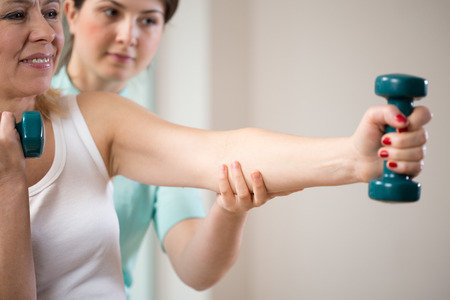Move over Arnold Schwartzenegger. The days of male dominated weight training are over!
Did you know that the average age that bone loss is affecting women is getting lower? Chronic diseases, cancers and cancer treatment, and dietary factors have contributed to bone loss diseases such as osteopenia and osteoporosis being diagnosed in much younger women. There is also a risk for men to develop osteoporosis and they have a higher chance of re-fracture than women. Bone weakness is men is associated with low testosterone.
The bad news is that people with bone disease have an increased susceptibility to suffer life-traumatising fractures such as hip fractures, which result in a loss of independence.
Osteopenia and osteoporosis are usually diagnosed with a bone density scan which measures the bone density your hip and spine. You will be given a risk score, or T-Score, for future fracture. The sooner you know if you have an issue with your bone density, the soon you can take positive action to manage the issue. And there is a lot you can do. Don’t wait until you have a fracture!
Your GP or specialist may manage the condition with dietary changes, calcium and vitamin D supplements, or you may be referred to a specialist or endocrinologist for advice and treatment. If you do have an unfortunate mishap that results in a fracture (and for some it can be as little as a sneeze), physiotherapy is appropriate to help you manage and heal. Most importantly though, there is much you can do to prevent the disease progressing this far, with a properly graded exercise program delivered by an exercise physiologist.
It is very important to know that recent research, conducted in Australia, shows that resistance training, specifically monitored weight lifting, has been shown to increase bone density more than some commonly prescribed drugs. But it’s important you don’t just rush out to the neighbourhood gym. Remember you may be more at risk of fracture, so you need to be closely monitored by a university qualified exercise professional such as an exercise physiologist or a physiotherapist, to ensure you start safely!
We are currently in the process of putting together an exercise class specifically for men and women suffering from osteopenia and osteoporosis. We anticipate that this will be up and running in 2018. Keep an eye out on our exercise class page. Osteoporosis and bone health will also be a topic in our new Women’s Health Seminar series starting soon. In the meantime, you are more than welcome to visit our clinic to discuss any bone health issues you may have.
For more information see:
The role of physiotherapy and osteoporosis
Osteoporosis Australia
Exercise Physiology and osteoporosis
Report on the latest bone health research into weight lifting


